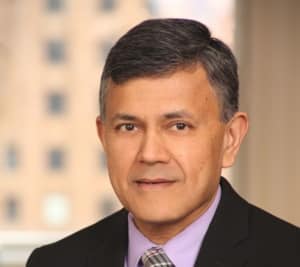|
What are hotels thinking about right now? Well, the No. 1 thing on their minds is, How do we reopen? When do we reopen? We were among the first and most drastically affected. Revenue fell to 5% for the first week and still remains some 70% below what it was for the same period last year. The U.N. General Assembly’s annual meeting, which usually kicks off our fall business season, is not going to take place. New York City always had the highest occupancy other than Orlando of any city in the country, and those occupancy rates are simply not going to be there for a long, long time. |
VIJAY DANDAPANI WHO HE IS President and CEO, Hotel Association of New York City AGE 62 GREW UP India RESIDES Harlem EDUCATION Bachelor’s in hotel management, Cornell University NEW HOME Dandapani immigrated to the U.S. in 1985 to attend college. PREVIOUS WORK In 2015, Dandapani assumed the role of chairman of the board at the Hotel Association; he became its president and CEO in 2017. Before that, he spent more than two decades at the helm of Apple Core Hotels, which operates four inns in the city. He’s been working in the industry for more than 30 years. FATHER’S FOOTSTEPS His dad was a fighter pilot in the Indian Air Force, and Dandapani enjoys flying recreationally. |
How are closed hotels preparing to reopen?
Big brands have apps where you can check in ahead of time. You can also pick your room ahead of time, so you will bypass the front desk and go straight to the room. The few hotels that are already open are doing hand sanitizer stations and temperature checks and providing personal protective equipment. If a customer walks in without a face mask, then hotels will provide one. Meeting spaces will operate at half or a third of what the normal capacity would be so that you can maintain social safety.
What will hotel landlords do about the property tax bill they’ll get July 1? What happens if they can’t pay?
A majority are going to default because they simply don’t have the money. You can’t take blood out of a stone. I realize the city doesn’t have money, and the city’s had an erosion of revenue on a number of levels. Some of the hotels will catch up. Most of them have to work out something with the city. In the normal course of things, there is an interest rate of 18% if you default, and then there is a penalty rate on top of that. Then if a whole year goes by, the city initiates “in rem proceedings,” and the city’s lien takes precedence over any debt or any other lien on the hotel.
What do you think the city should have or could have done to help hotel landlords?
We really believe they could have deferred taxes. It’s not really the city’s fault. I think the city’s trying and the federal government should step in because this is an industry that has 55,000 employees. That’s massive. The city can help us by targeting our cash flow problems on a temporary basis, but certainly we are looking to advocate for the federal government to help.
What will the recovery look like?
Recovery to levels somewhat close to what we had in 2019 is not going to happen until 2024—that’s four years from now. You’re going to see recovery next year from the horrible trench that we find ourselves in this year. Clearly, the moment we have a vaccine or a cure, you’ll see travel come back pretty quickly.

